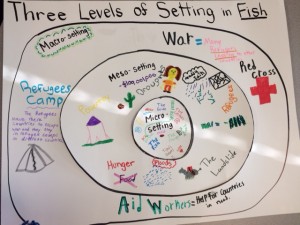Dear families:
In November, I would like to extend the challenge to each of the writers in my writing classes to participate in NaNoWriMo – National Novel Writing Month! This challenge will see students writing an entire novel by the end of the month of November!
Here is a bit of background from the NaNoWriMo Young Writers Program’s website:
“National Novel Writing Month happens every November! It’s a fun, seat-of-your-pants writing event where the challenge is to complete an entire novel in just 30 days. For one month, you get to lock away your inner editor, let your imagination take over, and just create!
That means participants begin writing November 1 and must finish by midnight, November 30. The word-count goal for our adult program is 50,000 words, but the Young Writers Program (YWP) allows 17-and-under participants to set reasonable, yet challenging, individual word-count goals.”
The purpose of this challenge is not to create a flawlessly designed book, but to dive deeply into the creative process of building a complex storyline and dynamic characters. This process will see your child at times feeling a bit blocked and even perhaps frustrated, but sticking with a story to make it truly a chapter book will have transformative power over their writing identities; it will be a chance for them to really dive in to the talent and potential they all have hiding inside as writers!
The biggest obstacle we are facing with this project is that we will not be able to spend much (if any) class time dedicated to it during the month of November as we’ll have to be writing essays; therefore, it will have to be an at-home project.
I very strongly encourage your child to participate. I have a number of resources that I will share with you to help your child if they decide to accept the challenge, and I will be happy to help you as much as possible throughout the month! I have set up an educator account with the organization and if your child does register for the program, I will add them as a student so that I can see their progress and give them help as they go along, whenever I can.
I would suggest starting now to help your child prepare for this challenge. Here’s how:
- Go to this website to create an account for your child. They are required to have an email address for this. All 4th and 5th graders at CBES have Gmail accounts (which we have not done anything with yet in class) that you could use to register them.
- Send me an email at katherine.cherry@acps.k12.va.us to let me know you have registered your child. I will find them on the database and add them to my class.
- Look through the resources that the website offers – you will find many helpful items to get your child started!
- Have a designated destination for your child’s work on their novel – in a special notebook? On a computer? On their Google Drive account? You decide what works best for your child.
- Set aside time for them to write every day throughout the month of November – 30 minutes a day should be enough, but maybe they will want more! 🙂
On a few days (3-4 days altogether) during November, we will take some class time to use as “workshop time” for kids to receive guidance and coaching from me while working on their novels, but most of their work on this project will have to be at home. Thanks for your understanding about our obligations.
Please email me with any questions you have! I am excited about this project and am here to help. I hope you and your child will decide to participate!
